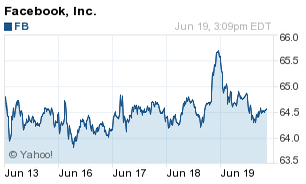Facebook Inc. (Nasdaq: FB) has built its own networking switches - crucial hardware devices that transport Internet information between machines - to power its increasing number of services.
 Code-named "Wedge," FB's new switch is built around the same microprocessor module that's at the core of its servers. It can also smoothly run the company's own customized software.
Code-named "Wedge," FB's new switch is built around the same microprocessor module that's at the core of its servers. It can also smoothly run the company's own customized software.
The network development challenges major players like Cisco Systems Inc. (Nasdaq: CSCO), Hewlett-Packard Co. (NYSE: HPQ), and Juniper Networks Inc. (NYSE: JNPR).
Jay Parikh, Facebook vice president of engineering, unveiled the new-age networking gear Wednesday at the Gigaom Structure conference in San Francisco. Parikh said the new gear, like much of Facebook's other custom-built hardware, will help the world's largest social media site grow even greater in size. Moreover, it will more effectively run Facebook's next wave of online services.
"We were running into a lot of things that slow down," Parikh said, referring to traditional networking gear. "It doesn't give us the flexibility we want; the control we want; the ability to configure things, monitor things, adjust [network] flows with things like Messenger, Instagram, Search and all the other workloads we have. Being able to manage all that on the network is a very rich area of optimization."
Having its own network switch could be lucrative to Facebook in other areas as well...
Why Wedges Will Work Wonders for Facebook
One key advantage for Facebook in having its own networking switches is price. Vendors such as Cisco and Hewlett-Packard sell high-margin computing hardware that comes bundled with their own proprietary software.
Also of significant importance to Facebook is reducing its reliance on hardware and shifting more dependency to its own sophisticated software that can be swiftly updated to meet changing technology trends and business demands.
Facebook didn't go so far as to say it will no longer buy networking switches from commercial sellers. But, Wedge moves it closer in the direction.
"Our goal is to help an industry, not to harm it," Matt Corddry, director of Facebook hardware engineering, told Bloomberg. "We're hopeful that they, through the Open Compute Project, join in to the innovations surrounding networking."
Cisco did not show any concern over FB's new networking process. A Cisco spokesperson told The Wall Street Journal it's more cost-effective and simple for most companies to buy conventional equipment rather than face "hidden costs" like personnel and software fees required to set up and manage Facebook-like switches.
"Today, seven of the ten largest Internet companies in the world are Cisco customers," the spokesman said in an email to The Journal. "We intend to ensure they stay our customers."
But Facebook confirmed it has already seen interest in working with Wedge from companies like Microsoft Corp. (Nasdaq: MSFT), Goldman Sachs Group Inc. (NYSE: GS), Bloomberg, and others.
Designed to work with other commercial and open-source networking products, Wedge works at speeds of up to 40 gigabits per second - the upper end of what most network switches presently carry. Wedge will, however, move to 100 gigabits in the near future.
The Internet switch market is projected to reach $61 billion in 2017, up some 5% from this year, according to Infonetics Research Inc. Even a small piece of that pie could be very lucrative to Facebook.
Facebook has made hardware available as an open source for several years via its project dubbed Open Compute. A number of companies across several industry sectors have taken part in the program, sharing ideas and providing key talent to work on new designs and trim costs.
Wedge is still in the testing phase. Facebook will likely run it on a large scale before making it widely available in major markets.
In afternoon trading Thursday, with major markets slipping on profit taking, FB stock was changing hands at $64.50, off 1.68%.
EDITOR'S NOTE: Most investors know tech is great for growth, but there are two tech sectors in particular that have many glorious days ahead of them...
Related Articles:
- Wall Street Journal:
Facebook Shows Off Its DIY Networking Gear - New York Times:
Facebook Makes Its Own Networking Switch - Bloomberg:
Facebook Shows Design for Networking Switch Pressuring Cisco


